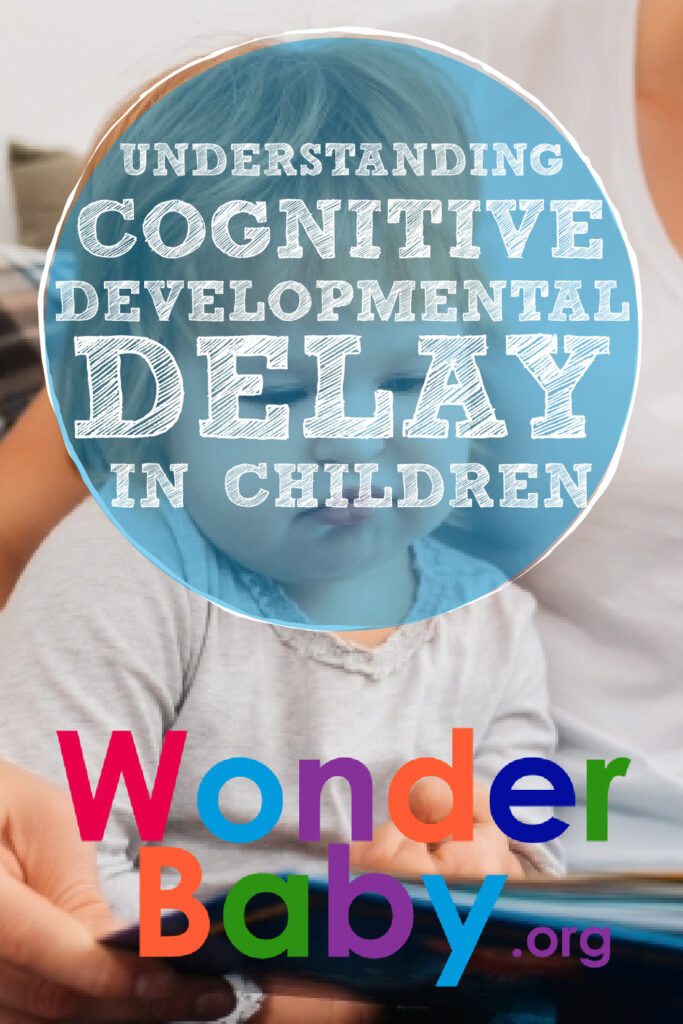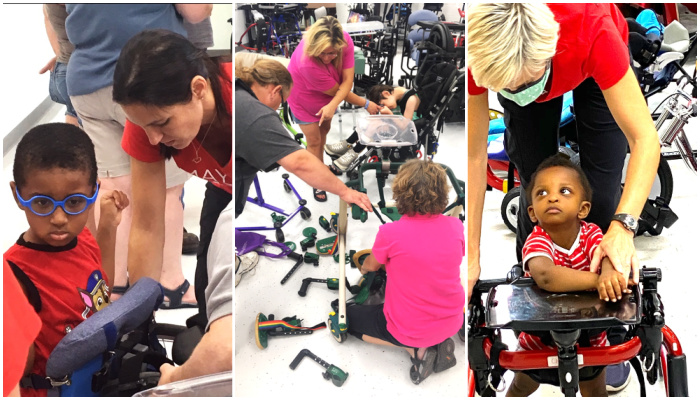Understanding Cognitive Developmental Delay in Children

- Cognitive development is the growth of a child’s ability to think and reason.
- Cognitive developmental delays can be identified early with appropriate developmental milestone screening tools.
- There are several causes of cognitive developmental delays.
- Early intervention activities can significantly help improve cognitive and academic performance.
- Treatment may include different types of therapies or specialized school services to effectively improve your child’s cognitive skills.
In the first few years of life, your child’s brain is rapidly developing. It’s exciting to watch your child learn and master new skills. It can be mesmerizing to observe an infant discover his hand and stare at it for weeks before figuring out how to something pick up.
Watching your child master different milestones can be exhilarating. But sometimes it’s worrisome. It might feel like your child is not grasping concepts like other children. This could be an sign of a cognitive developmental delay.
Understanding cognitive developmental delays in children can help you find the proper support to improve your child’s cognitive skills effectively.
What is Cognitive Developmental Delay?
There are several different types of developmental delays for children. Cognitive developmental delays occur when a child’s intellectual functioning, or thinking and reasoning, is significantly below the expected average for their age. A child with these limitations may learn more slowly than peers.
Developmental delays can improve with time. Some children can catch up on delays. However, some cognitive delays may be an early sign of a cognitive developmental disability such as
- Autism Spectrum Disorder (ASD)
- Attention Deficit Hyperactivity Disorder (ADHD)
- Dyslexia
- Intellectual Disability
- Learning Disability
Developmental disabilities are lifelong. Individuals with a cognitive developmental disability can make progress, learn, and thrive.
A child may be delayed in the cognitive milestones category of development only while other children may have developmental delays in several milestone categories. These categories include communication, gross motor, fine motor, and social-emotional. When a child has multiple delays in different categories it is called global developmental delay.

How Common is Cognitive Developmental Delay?
A cognitive developmental delay is only diagnosed when a child has a significant delay in intellectual functioning. A 2017 study by Vitrikas et al found that 15% of children have a developmental delay and of those children, 1%-1.5% specifically have cognitive developmental delays ranging from mild, moderate, to severe.
According to the CDC, 17% of children ages 3-17 in the United States have a developmental disability. Of those with a developmental disability, 1.7% are reported to have an intellectual disability.
Causes of Cognitive Developmental Delays
Several different risk factors can contribute to cognitive delays. Sometimes, however, it’s uncertain what causes a cognitive delay. Some potential causes of cognitive delays include:
Genetic Conditions
Rare diseases or duplications or deletions in chromosomes are sometimes linked to cognitive delays. Some genetic conditions, such as down syndrome, cerebral palsy, or fragile X syndrome, can also cause developmental delays
Prenatal Conditions
During pregnancy, prenatal alcohol or drug use can cause fetal alcohol syndrome (FAS) or neonatal abstinence syndrome (NAS). Exposure to toxins during pregnancy impact brain development in utero, which can lead to cognitive delays. Other injuries during pregnancy or maternal infections such as chicken pox or rubella, can also lead to developmental delays.
Birth Conditions
Inadequate oxygen at delivery, due to an umbilical cord restricting airflow, for example, can cause damage to the brain and therefore potential cognitive developmental delays. In addition, premature birth or low birth weight increases the chance of developmental delays.
Health Conditions
Traumatic brain injuries caused by infections such as meningitis or shaken baby syndrome can impact cognition and development. Other health concerns may include exposures to toxins such as lead or mercury, or seizure disorders.
Signs of Cognitive Developmental Delays
Signs of cognitive developmental delays can develop in the early stages of life or are sometimes identified later when a child begins school.
Some possible signs of cognitive developmental delays include:
- Delayed crawling, sitting, or walking
- Short attention span
- Difficulty remembering things
- Lack of curiosity
- Slow to learn things like feeding, dressing, or potty training
- Trouble thinking logically
- Trouble understanding rules and consequences
- Speech delay or difficulty speaking
- Infantile behavior that continues into preschool or school years
Cognitive development can be screened early. Reputable screening tools, such as the Ages and Stages Questionnaire, can help parents identify expected developmental milestones.
Cognitive Developmental Milestones for the First Year
| 2 Months |
|
| 4 Months |
|
| 6 Months |
|
| 12 Months |
|
If you are concerned your child might have some delays, it’s important to utilize screening tools as soon as possible. Most concerns present before a child begins school. Recognizing the signs of a delay and seeking assistance early can significantly improve your child’s development.
If unsure of age-appropriate milestones for your child, follow up with your doctor for developmental screenings or you can utilize the CDC milestone tracker and developmental resources.
Developmental guidelines are based on your child’s adjusted age instead of chronological age. If your child was born premature, make sure to adjust his age accordingly.
Factoring in your child’s unique needs is important when assessing development. Utilizing developmental guidelines for infants with visual impairment will give a more accurate understanding of your child’s development if your child is visually impaired.

What Can You Do to Help a Child with Delayed Cognitive Skills?
Early intervention is key to supporting a child with developmental delays. Reach out to your child’s doctor, or find a developmental pediatrician, if you feel your child has some signs of delayed cognitive skills.
Once a cognitive developmental delay is identified, you will be referred to specific resources to meet your child’s needs. You can also reach out to early childhood intervention programs in your state for support.
Early childhood intervention programs might include a referral to a speech therapist, physical therapist, behavioral therapy, or special education services depending on the individual needs of your child. These services are effective and can help improve cognitive and academic performance.
What is the Treatment for Cognitive Developmental Delays?
Treatment for cognitive developmental delays will be individualized for your child’s particular needs. Most therapies or services will directly involve you and your child. Incorporating the skills learned in therapy or school at home will help improve your child’s cognitive skills more effectively.
Treatment plans for your child might include:
Speech Therapy
If there are concerns with speech delays your child might meet with a speech language pathologist. During speech or language therapy sessions you and your child will learn different techniques to help with language development.
Physical or Occupational Therapy
A referral for physical therapy (PT) or occupational therapy (OT) may occur if your child has fine motor or gross motor delays. If possible, refer to pediatric physical therapists or pediatric occupational therapists to best meet your child’s unique needs.
During therapy sessions, you and your child will focus on activities to help build gross motor skills or fine motor skills. Gross motor skills focus on the large muscles of the body. For example, if your infant was delayed sitting or crawling, physical therapy will focus on building the large body muscles for specific motor activities.
Play or Behavioral Therapy
Play therapy or behavioral therapy can be a highly effective treatment modality for children with cognitive delays. During sessions, therapists might focus on building coping skills to reduce problematic behaviors or helpful social skills. As a parent, you will learn different skills to implement in the home to further assist your child.
Special Education Services
Older children involved in the education system might receive a referral to special education services. These services will allow the school to implement more support and potential therapies in the school setting. This might include an individual education plan or IEP. Sometimes this may feel daunting, but having support and understanding of IEP strategies before a meeting can be beneficial.
Can a Child Catch Up on Developmental Delays?
Some children catch up on developmental delays while others may develop a cognitive developmental disability.
Although there is no “cure” for a cognitive developmental disability, know that your child can live a fulfilling life. A child with a cognitive developmental delay or disability will learn many skills and have the ability to learn new things, it just may take more time.

Related Posts

Special Needs
5 Spring Cleaning Tips for Families of Children with Disabilities
Spring cleaning is an opportunity to create a more accessible, organized, and supportive space for your child with disabilities. Declutter, deep clean, and refresh!

Visual Impairment
The Gift of Understanding: How a Young Child Helps His Blind Father Navigate Life
When a parent is blind, it’s natural for people to wonder how their sighted child will adapt. Will they struggle to understand their parent’s needs? Will they feel burdened by...

Assistive Technology, Support
May We Help: Engineering Independence for People with Disabilities
May We Help is dedicated to designing and building custom solutions that help individuals of all ages achieve mobility, access, and independence, all at no cost.